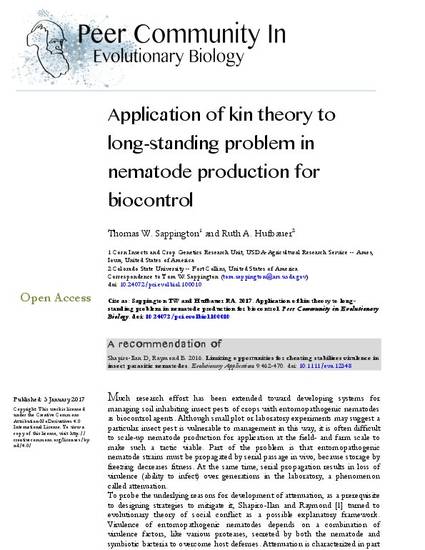
Article
Application of kin theory to long-standing problem in nematode production for biocontrol
Peer Community in Evolutionary Biology
Document Type
Article
Disciplines
Publication Version
Published Version
Publication Date
1-3-2017
DOI
10.24072/pci.evolbiol.100010
Abstract
Much research effort has been extended toward developing systems for managing soil inhabiting insect pests of crops with entomopathogenic nematodes as biocontrol agents. Although small plot or laboratory experiments may suggest a particular insect pest is vulnerable to management in this way, it is often difficult to scale-up nematode production for application at the field- and farm scale to make such a tactic viable. Part of the problem is that entomopathogenic nematode strains must be propagated by serial passage in vivo, because storage by freezing decreases fitness. At the same time, serial propagation results in loss of virulence (ability to infect) over generations in the laboratory, a phenomenon called attenuation.
Rights
Works produced by employees of the U.S. Government as part of their official duties are not copyrighted within the U.S. The content of this document is not copyrighted.
Language
en
File Format
application/pdf
Citation Information
Thomas W. Sappington and Ruth A. Hufbauer. "Application of kin theory to long-standing problem in nematode production for biocontrol" Peer Community in Evolutionary Biology (2017) Available at: http://works.bepress.com/thomas_sappington/98/

This article is published as Sappington TW and Hufbauer RA. 2017. Application of kin theory to longstanding problem in nematode production for biocontrol. Peer Community in Evolutionary Biology. doi: 10.24072/pci.evolbiol.100010.